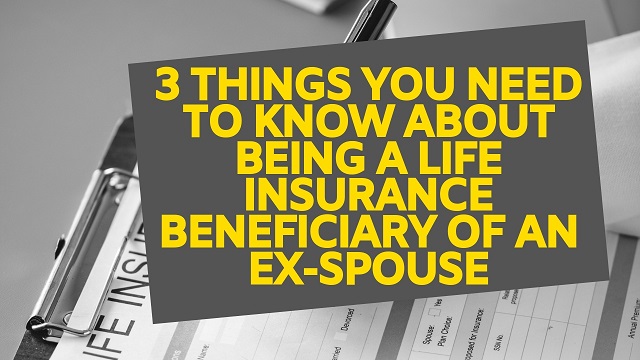Everyone who purchases a life insurance policy is required to provide the name of a beneficiary who will collect the policy payment proceeds from the cover in the event that the insured person dies. For most people, especially those that are married, their spouse is usually the one named as the beneficiary.
No one wishes for a divorce to happen but when it does, a lot of things get affected. A life insurance policy can be viewed in a way as an investment that will be enjoyed by the beneficiaries when the insured person dies.
When a divorce happens, there is always a bone of contention as to whether you as the listed beneficiaries are still eligible to collect payments when your ex-spouse dies. To shed more light on this issue, here are the 3 things you need to know about being a life insurance beneficiary of an ex-spouse:
1. There Are Policies That May Deny You Benefits Of The Insurance Cover
The general rule of insurance is that the person named as the beneficiary is the one that collects payments from the life insurance cover. There are instances, however, when you have been listed as a beneficiary by your ex-spouse can become unentitled to receive the benefits.
If there is a clause in the insurance policy that excludes the beneficiary from receiving benefits if the beneficiary’s marital status does not highlight him or her as being married to the insured person, then the beneficiary won’t receive the benefits.
There are some states such as Michigan which have set laws in place that cancel a married person’s rights to receive benefits from a life insurance cover once divorce happens. It’s important to be aware of such laws and clauses if you were listed as a beneficiary by your ex-spouse.
2. You Won’t Receive Payments If Your Ex-spouse Changed You As The Beneficiary
It may be that you and your ex-spouse used to pay for the life insurance premiums together from, say, a joint account. If after divorce your ex-spouse changed you as the named beneficiary and put up someone else, you won’t be eligible to receive the policy payments once your ex-spouse dies.
Reason for this is that if he or she was the one registered as the owner of the insurance cover he or she retained the right to name the beneficiary of it. Unless there was a court order in place after the divorce instructing that you remain as the beneficiary, then the policy payments will go to the person who is currently named as the beneficiary.
3. A Written Will Doesn’t Affect You As A Beneficiary Of A Life Insurance Policy
If you divorced your ex-spouse and he or she wrote a will listing his assets and the beneficiaries to them, you will still be a beneficiary of the life insurance cover your ex-spouse took up if you were listed as the beneficiary. Reason for this is that life insurance benefits are not distributed through a will but through the policy terms of the insurance cover.
As long as you are the one listed as the beneficiary on the cover, you are subject to receive the policy payments upon your ex-spouse’s death.
Conclusion
These are just a few pointers. Here’s some more helpful information on life insurance beneficiary ex-spouse.

